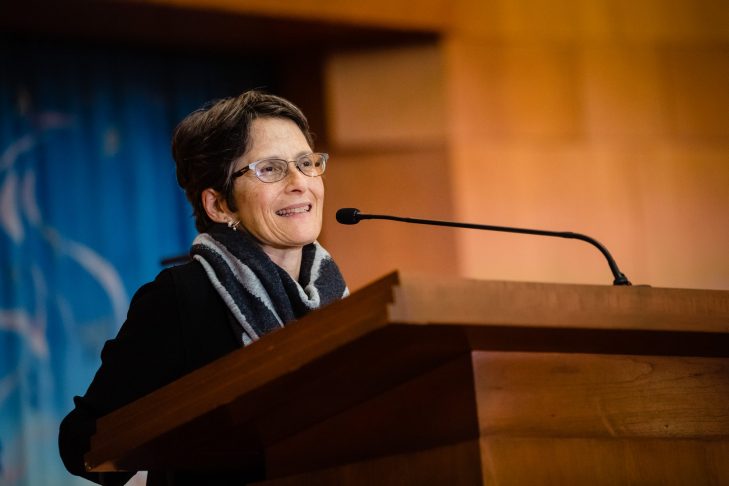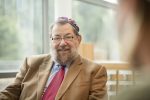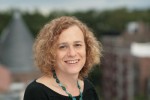“I just love the spiritual sensibility that’s reflected here, one that is, itself, grounded on Earth, but reaches beyond. And one that doesn’t overreach, doesn’t claim to know more than we can know, one that’s in love with the aching complexity of the human experience, but also insists that there’s something beyond, that there is a transcendence that touches our existence and tugs at us in ways that are both mysterious and palpable.”
—Hebrew College President Rabbi Sharon Cohen Anisfeld
In this episode of “Speaking Torah,” Rabbi Jordan Schuster explores the connection between John Keats and the story of Jacob’s ladder, and teaches that regardless of how fissured this world feels, ladders, like bridges, hold the possibility for connection and relationship.
Can a single person actually confront and repair really difficult relationships without having a support system? Yes. However, help makes for lighter work. And in this essay, Jordan reflects on Keats’s desire to escape the world up the ladder, versus Jacob’s desire to use the ladder to foster unity in the human world, and Jordan’s own desire for our communities and institutions to play a role in this work.
Reading Jordan’s work, we have Rabbi Sharon Cohen Anisfeld, president of Hebrew College. Sharon is passionate about inviting her students to be creative participants in the ongoing dialogue through which Torah is revealed and renewed.
Listen to the full episode here, or on Apple Podcasts, Stitcher or Spotify.
What you’ll discover from this episode:
- Jordan’s multi-faceted interpretation of The Ladder and the link between the perfect and the imperfect, the human and the divine
- How Jordan incorporates the voice of Jacob, Rashi and John Keats to perfectly illustrate his interpretation of The Ladder
- How a cynical nihilistic understanding of the world will result in troublingly transcendent theologies
- Why The Ladder doesn’t only serve as a vertical metaphor to connect us with the divine but has the ability to link us with all of humanity and the demons within us
- The relevance Jordan’s essay has today around rebuilding difficult relationships and the power of structures that enable us to work together
Featured on this episode:
Rabbi Jordan Schuster (writer) serves as director of the Rabbinical School’s Mekorot program and a faculty member at the Rabbinical School. Before receiving his ordination through Hebrew College in 2018, Jordan taught Yiddish literature and language at Columbia University in New York, studied psychoanalysis and queer theory in San Francisco, and tended the gardens and greenhouse of a small local grocery store in southeastern Wisconsin. He loves to bring Jewish texts—both classical and modern—to life with his students, and he feels blessed to watch how the meanings of these texts shift, refract and evolve as he and his students forge a way through them together.
Rabbi Sharon Cohen Anisfeld (reader) became president of Hebrew College in July 2018. Rabbi Anisfeld first came to Hebrew College in 2003 as an adjunct faculty member of the Rabbinical School and then served as dean of students from 2005-2006. She went on to serve as dean of the Rabbinical School from 2006-2017. Rabbi Anisfeld graduated from the Reconstructionist Rabbinical College in 1990 and subsequently spent 15 years working in pluralistic settings as a Hillel rabbi at Tufts, Yale and Harvard universities. She has been a regular summer faculty member for the Bronfman Youth Fellowships in Israel since 1993 and is co-editor of two volumes of women’s writings on Passover.
Rabbi Jeffrey Summit, Ph.D. (host), is director of the Hebrew College Innovation Lab. He is research professor in the department of music and Judaic studies at Tufts University and senior consultant for Hillel International. The author of several books, among his many awards are a 2018 Hebrew College honorary degree, a Grammy nomination for his album “Abayudaya: Music from the Jewish People of Uganda,” the Edgar M. Bronfman Award for Lifetime Accomplishment in Hillel Professional Leadership and the Tufts Hosea Ballou Medal.
Torah is one of the most profound sources of wisdom available to us. In Hebrew College’s new podcast, “Speaking Torah,” Jewish leaders from around the world read essays from Hebrew College faculty and rabbinical alumni about how Torah can help us navigate the most pressing issues of our time. Together, we explore the ways Torah can help us approach the world with creativity, healing and hope. Find out more at hebrewcollege.edu/podcast.
This post has been contributed by a third party. The opinions, facts and any media content are presented solely by the author, and JewishBoston assumes no responsibility for them. Want to add your voice to the conversation? Publish your own post here. MORE







